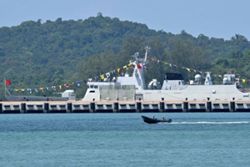
Shin Yang's domestic container feeder vessel, MV Danum 112 at Northport wharf. - Filepic
KUCHING: Shin Yang Group Bhd (SYG) is expecting new orders to flow in for the construction of offshore supply vessels (OSVs) and replenishment of ageing OSVs due to rising demand with the recovery of the global oil and gas industry.
(SYG) is expecting new orders to flow in for the construction of offshore supply vessels (OSVs) and replenishment of ageing OSVs due to rising demand with the recovery of the global oil and gas industry.
Chief operating officer Richard Ling said SYG (formerly Shin Yang Shipping Corp Bhd) has received many enquiries from both Malaysian and foreign companies on the construction of new OSVs and recycling of ageing OSVs.
“With the gradual recovery of charter rates in the OSV segment and the current gap in new building orders for different OSVs over the past few years and recycling of ageing OSV, we foresee a steady and healthy increase in orders for the replenishment of OSV for the next few years to come,” he told StarBiz.
Ling said SYG is currently constructing three anchor-handling tug supply (AHTS) vessels with a combined contract value of US$30mil for Singapore clients.
Under the contracts, SYG is only involved in building the hull of the AHTS and installing the equipment, engine and other instruments of the vessels provided by the shipowners.
“One of the AHTS will be delivered in the third quarter of 2024 (3Q24) and the other two in 2025. These vessels will be deployed to Saudi Arabia,” he added.
Ling said SYG is eyeing a share of new OSV shipbuilding contracts under Petroliam Nasional Bhd’s (PETRONAS) Project Safina Phase 2, which targets to build more OSVs to replace ageing vessels.
The PETRONAS Activity Outlook 2024-2026 states that Project Safina Phase 2 is expected to commence its contracting exercise in 3Q24.
Under Project Safina Phase 1, PETRONAS, through its petroleum arrangement contractors, has commissioned the construction of 11 OSVs.
Its completion will be done in stages from 2023 and culminate in 1Q24, according to the Association of Marine Industries of Malaysia recently. Phase 1 involves the construction of 16 OSVs.
It was reported that this new-build programme aims to construct up to 100 vessels in four years to phase out the old OSVs, which are reaching the age limit of 15 years.
The newly built vessels will mainly be deployed for upstream activities and chartered by oil majors on long-term contracts.
Ling said a new OSV, depending on the type and size, will cost RM70mil to RM100mil (construction cost and installed equipment and instruments) and require 18 to 20 months to complete.
According to him, SYG is among four of the major Malaysian shipbuilders capable of constructing OSVs, such as AHTS and work boat/barge.
The PETRONAS Activity Outlook 2024-2026 said the shortage of Malaysian-flagged OSVs to support drilling and wells projects is expected to continue in the near future.
The outlook for the next three years depicts stable year-on-year demand for vessels supporting projects and drilling activities.
The national oil company said OSV owners embarking on fleet renewal should consider fuel efficient technologies, including diesel electric with battery (hybrid) vessels, to reduce total operational costs for charterers.
Sealink International Bhd , a Miri-based shipbuilder and vessel charterer, is upbeat about the demand for OSVs to further accelerate in 2024, as the number of OSVs currently available in the market is very limited.
, a Miri-based shipbuilder and vessel charterer, is upbeat about the demand for OSVs to further accelerate in 2024, as the number of OSVs currently available in the market is very limited.
“It is our view that the industry is positioned to benefit from an increase in demand over the medium to long term, with a slowly shrinking supply of vessels.
“We believe this imbalance in supply and demand will continue to provide the opportunity for charter day rate and utilisation to increase,” the company said when releasing its financial year 2023 results recently.
In the financial year 2023 (FY23), Sealink reported a sharp increase in revenue from its ship charter business to RM106.2mil from RM65.3mil in FY22, as a result of higher utilisation of vessels.
Ling said SYG is now experiencing robust business for its ship repair division, as its main floating docks in Miri are achieving 100% utilisation while the utilisation rate of its other floating docks is about 70%.
The group also operates three slipways (two in Miri and one in Bintulu) for ship repair works. “The ship repair business is very good,” he added.
Besides shipbuilding and ship repair, SYG’s core business is in container, dry bulk and chemical shipments.
In FY23, the group recorded group net profit of about RM45.6mil on revenue of RM457.7mil, as compared to RM88.2mil on revenue of RM481.2mil in FY22.
Ling attributed the weaker yearly earnings to softening freight rates, which had dropped by about 40% from the peak in 2022, but are still higher than pre-Covid pandemic levels.
He said cargo volumes have stabilised, with higher export volumes from energy-intensive industries in Samalaju Industrial Park, Bintulu and Kota Kinabalu Industrial Park in Sabah.










































